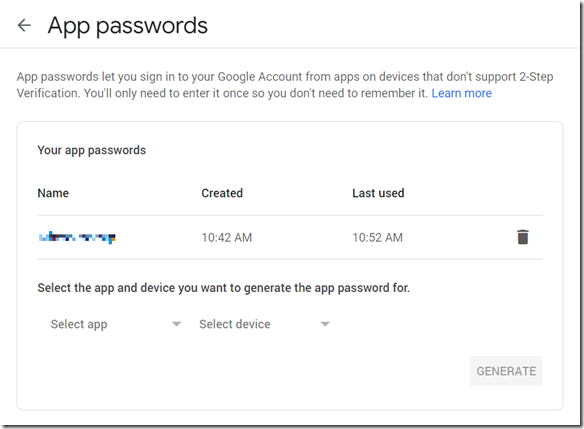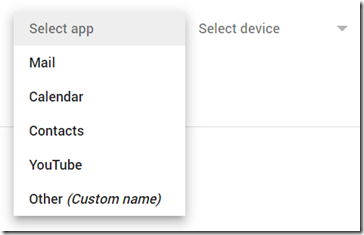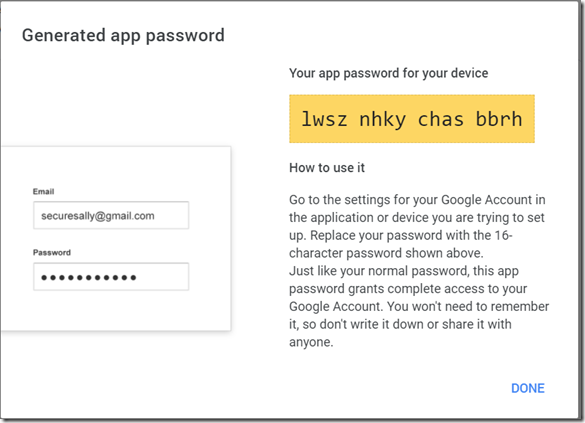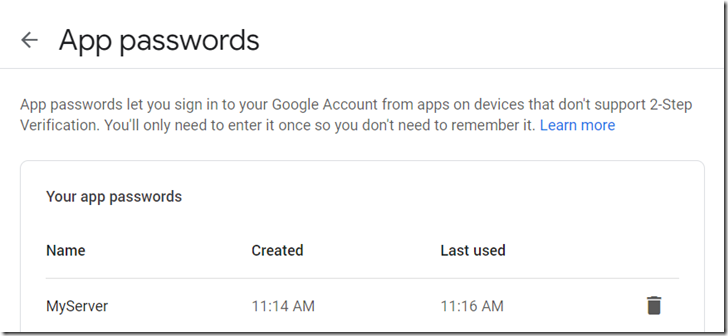Gmail Workspace / Gmail Suite send e-Mail from server using msmtp
We are in the process of migrating to Gmail, to be able to delegate managing a mail server.
We used ssmtp on our server to email mails before, using our own mail server (Zimbra).
I have now managed to get Gmail Workspace working, and would like to share some pointers on how to do that.
This is done on a Debian / Ubuntu system.
Set up 2 factor authentication
Login to your Google account:
Click on the Security tab and scroll down to 2-step Verification, enable it.
You will probably need to provide your mobile phone number to Google or choose another option here.
Set up an App password
Click on “App passwords” below the 2-Step Verification.
Google will require you to sign-in again.
(Note I already have an app password set up, your screen might look a bit different in the beginning)
Click on Select app, and select Other (custom name)
You can enter any name you like – it is for your reference. For example,
Click on Generate
A popup window will appear. Your app password will be shown only this one time, so be sure to copy it.
Note that the password is just shown as four segments of four characters each to be easier to read, there will be no spaces in the actual password.
In this case the password is
lwsznhkychasbbrh
Click on Done.
Switch to msmtp
ssmtp is not maintained anymore, and will also possibly have issues connecting to Gmail:
/var/log/syslog:Oct 15 09:52:22 Athena sSMTP[19076]: SSL connection using ECDHE_ECDSA_CHACHA20_POLY1305
/var/log/syslog:Oct 15 09:52:22 Athena sSMTP[19076]: Authorization failed (535 5.7.8 https://support.google.com/mail/?p=BadCredentials ************.79 – gsmtp)
ssmtp: Authorization failed (535 5.7.8 https://support.google.com/mail/?p=BadCredentials *************.4 – gsmtp)
Apparently the ECDHE auth part might be a problem for some users on newer systems.
The workaround is to switch to msmtp.
Remove ssmtp (all commands run as root)
apt-get purge ssmtp
Install msmtp
apt-get install msmtp msmtp-mta
Set up msmtp
nano /etc/msmtprc
Put in the following data:
defaults
auth on
tls on
tls_starttls on
tls_trust_file /etc/ssl/certs/ca-certificates.crt
logfile /var/log/msmtp.logaccount gmail
host smtp.gmail.com
port 587from [email protected]
user [email protected]
password lwsznhkychasbbrhaccount default : gmail
Change your login data (from, user, and password – I have taken lwsznhkychasbbrh from the example above).
Note that you do not need to restart a service or anything like that – the access data will be used for the next email the server tries to send.
Use the app password generated above – your account password will not work:
msmtp: authentication failed (method PLAIN)
msmtp: server message: 534-5.7.9 Application-specific password required. Learn more at
msmtp: server message: 534 5.7.9 https://support.google.com/mail/?p=InvalidSecondFactor *************.29 – gsmtp
msmtp: could not send mail (account default from /etc/msmtprc)
Also, please note that the app password should be entered without spaces between the characters (as discussed above)
Secure this file (it contains login data!):
chmod 600 /etc/msmtprc
Enable Less secure apps
https://admin.google.com/u/2/ac/security/lsa
Unfortunately, you will also need to enable Less secure apps access for your accounts in Google Admin, otherwise you would continue to get the same error message:
msmtp: authentication failed (method PLAIN)
msmtp: server message: 535-5.7.8 Username and Password not accepted. Learn more at
msmtp: server message: 535 5.7.8 https://support.google.com/mail/?p=BadCredentials **********.34 – gsmtp
msmtp: could not send mail (account default from /etc/msmtprc)
Change this to “Allow users to manage their access to less secure apps” and click on Save.
Send a test message
If everything works correctly, you can now send a test message:
echo ‘test’ | msmtp [email protected]
If this command returns without an error, then everything works.
Also, if you refresh your App passwords view, you will see that the app password has been used (“last used”):
(this might not always be accurate as per my tests, though).
If it would not work, you would get an output similar to the following:
msmtp: authentication failed (method PLAIN)
msmtp: server message: 535-5.7.8 Username and Password not accepted. Learn more at
msmtp: server message: 535 5.7.8 https://support.google.com/mail/?p=BadCredentials ***********.9 – gsmtp
msmtp: could not send mail (account default from /etc/msmtprc)
Note: This error will also appear if you delete your app password using the trash can icon you can see above. This, by the way is a useful feature of the App passwords: if you suspect a breach, you can simply delete the app password and set up your device with another app password.
If you continue to get this error, check whether you have enabled less secure apps, as I have instructed you to do (above).
Note II: you will get an info about freshly created app passwords in your email account:
Note III: you will also get the sent messages in your sent folder:
Ref
- https://doc.ubuntu-fr.org/msmtp
- https://stackoverflow.com/questions/63560494/gmail-is-blocking-to-send-email-via-smtp
- https://www.getmailbird.com/setup/access-gmail-com-via-imap-smtp
- https://support.google.com/a/answer/176600?hl=en (this also mentions an SMTP relay service, which can be used as an alternative)
Bonus
Google mentions their rate limits on this page:
- 10.000 recipients per day for the SMTP relay service (requires a static IP address or valid G Suite user sign-in)
- 2.000 messages per day for the Gmail SMTP










